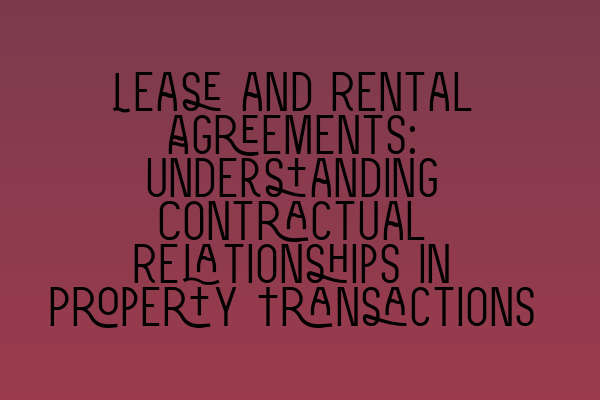Lease and Rental Agreements: Understanding Contractual Relationships in Property Transactions
When it comes to property transactions, lease and rental agreements play a crucial role in establishing the contractual relationship between parties. Whether you are a landlord or a tenant, understanding the intricacies of these legal documents is essential to protect your interests and ensure a smooth transaction.
Lease and rental agreements serve as the foundation for a harmonious landlord-tenant relationship. These legally binding documents outline the rights, responsibilities, and obligations of both parties, establishing a framework for the tenancy period. By clearly defining the terms and conditions, lease and rental agreements provide clarity and prevent potential misunderstandings that may arise during the tenancy.
The Key Components of Lease and Rental Agreements
Lease and rental agreements typically consist of several key components:
- Parties involved: The agreement should clearly state the names and contact details of both the landlord and the tenant. This ensures that both parties can be easily reached for communication purposes.
- Property description: The agreement should include a detailed description of the property being leased or rented, including its address and any specific features or amenities.
- Lease term: The agreement should specify the duration of the tenancy, including the start and end dates. It may also outline the conditions for lease renewal or termination.
- Rent payment details: The agreement should clearly state the amount of rent to be paid, the payment schedule (e.g., monthly, quarterly), and any late payment penalties or fees.
- Security deposit: The agreement should outline the amount of the security deposit, any restrictions on its use, and the conditions for its refund at the end of the tenancy.
- Utilities and maintenance: The agreement should specify which party is responsible for paying for utilities and maintaining the property. It may also outline any restrictions on modifications or alterations to the premises.
- Insurance: The agreement may require the tenant to obtain renter’s insurance to protect their personal belongings and liability. It may also specify any insurance requirements for the landlord.
- Termination and eviction: The agreement should outline the procedures and grounds for termination or eviction, including any notice periods required.
By carefully addressing these components in lease and rental agreements, parties can minimize potential disputes and protect their rights.
The Importance of Legal Advice
Given the legal complexities of lease and rental agreements, seeking legal advice is highly recommended for both landlords and tenants. A solicitor specializing in contract law can provide valuable guidance and ensure that your rights and interests are properly protected.
Legal advice can help you understand the implications of various clauses and provisions in the agreement, negotiate for favorable terms, and ensure compliance with applicable laws and regulations. By consulting a solicitor, you can avoid costly mistakes and ensure a mutually beneficial and legally sound contractual relationship.
If you are preparing for the SQE exams, it is important to have a solid understanding of contract law, including lease and rental agreements. The SQE 1 Preparation Courses offered by SQE Contract Law can provide you with the necessary knowledge and practice materials to excel in this area.
For additional practice, you can also access SQE 1 Practice Exam Questions and SQE 1 Practice Mocks FLK1 FLK2 to test your understanding of contract law concepts.
Are you preparing for the SQE 2 exams? Get an edge by enrolling in SQE 2 Preparation Courses.
Stay informed about the latest SRA SQE exam dates by checking SRA SQE Exam Dates regularly.
In conclusion, lease and rental agreements are essential documents that establish the contractual relationship between landlords and tenants. By understanding their key components and seeking legal advice, parties can ensure a smooth and mutually beneficial property transaction.
